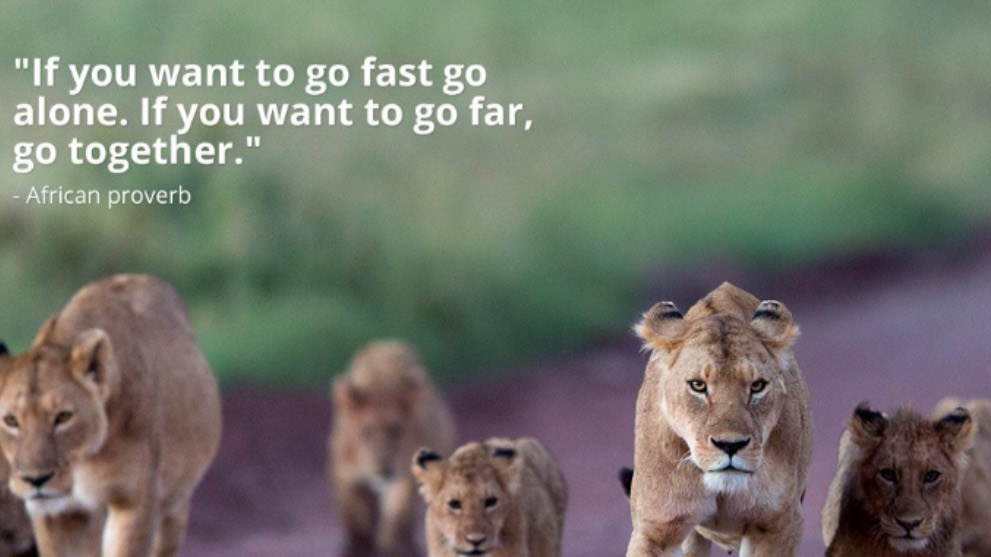
Date: April 25, 2019
An African proverb goes, “It takes a village to raise a child”. It means that the healthy development of a child is a result of the experiences, care and attention the child gets from meeting, interacting and learning from different members of the community. This sense of community gives the child a sense of belonging and security to grow and develop into a fully functioning adult. In a way, it captures the essence of the power of cooperation and collaboration whether in the startup and entrepreneurial space or elsewhere.
By regional collaboration and cooperation in the African startup ecosystem, we do not mean more coworking spaces or technical hubs alone. There is no denying that coworking spaces and technical hubs have many merits; they enable entrepreneurs and startup teams to work amidst like-minded individuals, innovators and peers, build networks and collaborate, learn from shared experiences and reap the advantages of a diverse work environment. Coworking spaces and technical hubs are important parts of the startup culture. But, with regional cooperation and collaboration, we are looking at the broader spectrum of players across the different countries of Africa and how they all stand to benefit by working together.
The countries in the African continent have a lot in common right from a shared history, shared cultural and social values to similar political settings. As a result of these, a lot of shared problems and challenges. For instance, large scale depletion of natural resources by the colonial rulers and later, the war mafia, cultural barriers denying education and economic freedom to women, food insecurity from barren lands and poorly developed agricultural practices, etc. As more startups and enterprises try to solve some of these problems through technological innovations and creative, non-tech solutions, collaboration and regional cooperation creates an enabling environment for the inclusive growth of the startup infrastructure, culture and a powerful ecosystem.
A powerful ecosystem, a strong startup/entrepreneurial culture and inclusive startup infrastructure will enable startups and entrepreneurs to leverage the opportunities and tackle the challenges in an effective manner. Let us clarify here that regional cooperation cannot be limited to entrepreneurs and startups alone but include the investors, angels, mentors, academia, civil society and government agencies.
1. Scalability and access to more markets: For ventures in Africa to scale and accordingly get later stage funding, it is necessary that they look beyond their own national borders and expand to other African countries in the long-term. Cooperation between governments as well as startups will go a long way in leveraging the scalability potential and access to markets. Government cooperation across the region will enable startups to easily process cross-border payments with lower cross- border transaction costs, effectively allocate capital and resources, and better manage risks.
Let us not forget that the continent has vast potential for most of the solutions brought about by the entrepreneurs and startups since these are socially-relevant and look to solve hitherto unsolved challenges, say in agricultural sustainability, financial access and technology, healthcare access, food security etc.
2. Tackling international competition better: Through regional cooperation and collaboration, startups can strengthen their market position and develop a competitive edge. This is because they have a better understanding of local markets and the local context allowing them to streamline activities effectively and they are better placed to tackle language barriers than even international giants.
3. Peer support and networks: The entrepreneurial journey can get extremely lonely and having support networks and peers who understand does have tangible benefits. Collaboration and cooperation help bridge gaps in the networks and markets, share best practices and most importantly, learn.
4. Non-competitive and cooperative environment: Collaborative and community-oriented support networks across the borders provide a cohesive, non-competitive environment to entrepreneurs wherein they are not at loggerheads with one another and not competing for investor attention. So, they can share experiences, gain access to investors and mentors across borders, get valuable contacts and so on.
5. Access to more mentors in one’s own domain: The importance of mentors to startups cannot be stressed enough. For tech startups, it is much easier to find mentors either in one’s own country or from abroad than for startups say in the agricultural or food security or healthcare space. The problem is more pronounced for women entrepreneurs and entrepreneurs from disadvantaged circumstances. They have fewer role models, leaders and mentors to look up to and these mentors are scattered across the different countries in the region. Through regional collaboration and cooperation, access to mentors and role models can be increased.
If we look at countries where a strong startup culture exists like the US and France, there is a strong connection between the academia and the startup ecosystem. Universities serve as unique platforms for research, innovation and testing. They help bring together the different stakeholders like thought leaders, corporates, regulators, etc. and strengthen the local ecosystem.
There is a strong case in favor of such collaboration as well because they can also help in skill development and capacity building of practicing and budding entrepreneurs and the youth of the region, bridge gaps and building an enterprising generation.
The industry and existing corporates look at startups as their competitors and adversaries. But there is a strong case for collaboration between the industry and the startup ecosystem in Africa. The corporates can leverage the solutions brought about by the startups to create an edge in and expand their markets. For instance, banks can leverage one of the many fintech solutions available in Africa. Startups stand to benefit from access to the corporate house’s infrastructure, resources, contacts, data, markets, etc. and effectively scale up.
We would like to conclude with another African proverb.